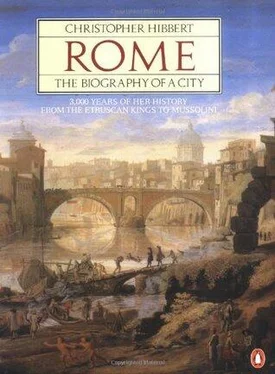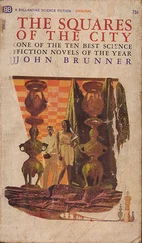Christopher Hibbert - Rome. The Biography of the City
Здесь есть возможность читать онлайн «Christopher Hibbert - Rome. The Biography of the City» весь текст электронной книги совершенно бесплатно (целиком полную версию без сокращений). В некоторых случаях можно слушать аудио, скачать через торрент в формате fb2 и присутствует краткое содержание. Жанр: Культурология, Искусство и Дизайн, на английском языке. Описание произведения, (предисловие) а так же отзывы посетителей доступны на портале библиотеки ЛибКат.
- Название:Rome. The Biography of the City
- Автор:
- Жанр:
- Год:неизвестен
- ISBN:нет данных
- Рейтинг книги:3 / 5. Голосов: 1
-
Избранное:Добавить в избранное
- Отзывы:
-
Ваша оценка:
- 60
- 1
- 2
- 3
- 4
- 5
Rome. The Biography of the City: краткое содержание, описание и аннотация
Предлагаем к чтению аннотацию, описание, краткое содержание или предисловие (зависит от того, что написал сам автор книги «Rome. The Biography of the City»). Если вы не нашли необходимую информацию о книге — напишите в комментариях, мы постараемся отыскать её.
Rome. The Biography of the City — читать онлайн бесплатно полную книгу (весь текст) целиком
Ниже представлен текст книги, разбитый по страницам. Система сохранения места последней прочитанной страницы, позволяет с удобством читать онлайн бесплатно книгу «Rome. The Biography of the City», без необходимости каждый раз заново искать на чём Вы остановились. Поставьте закладку, и сможете в любой момент перейти на страницу, на которой закончили чтение.
Интервал:
Закладка:
Politically opposed to the Optimates were the Populares, not, as their name might imply, a proletarian group, but mostly men from old senatorial families who were nevertheless in favour of constitutional, judicial and land reforms. They were supported by the Equites who saw much virtue in the proposals for reform advocated by Tiberius Gracchus, a young aristocrat who was elected Tribune for the People for the year 133 B.C. But Gracchus's provocative plans so alarmed the Optimates that soon after his election he was murdered at the door of the Temple of Jupiter Capitolinus. Three hundred of his supporters were clubbed to death and their bodies thrown into the Tiber. Tiberius's brother, Gaius Gracchus, a fine orator, subtle yet passionate, endeavoured to carry on his brother's work as a reformer. For a time he seemed on the verge of success but his plans to grant full Roman citizenship to most Italians, and thus to allow outsiders to share the Romans' free circuses, their cheap grain and the bribes they enjoyed for placing their votes in the People's Assembly, lost him the support of the Roman people. And in 121 B.C. he, too, was defeated. Forced to flee for his life, he reached the wooden bridge across the river and, there, on the point of capture, he presented his throat to a faithful slave who had accompanied him. No less than three thousand of his supporters were afterwards executed without trial.
Political differences in Rome had ended in unprecedented violence. The poor were more deeply antagonistic than ever towards the rich, and the Roman Republic was in its early death throes. At this time there rose to prominence a man from outside the governing class, a tough, crudely outspoken soldier named Gaius Marius who refused to learn Greek on the grounds that it was absurd to use a language which had to be taught by a subject race, and who had grown rich as a businessman and extorter of taxes. He had served with distinction against a royal rebel in north Africa and against German tribes on the northern Italian frontiers; and, by recruiting troops irrespective of their property qualifications, had created a new kind of army, no longer composed of citizens fulfilling a civic duty, but of volunteers without other means of support who, after fighting under the silver eagles, the emblems of Rome, remained loyal to the general who could provide for them rather than to the Senate which distrusted them.
This transference of the legions' loyalty was to have profound consequences in the future; but for the moment the fears of the Senate were concentrated not so much upon the army but upon a war in Italy provoked by the rage of Rome's Italian allies who, after all they had done to secure victory in north Africa and against the German tribes, were still denied Roman citizenship, a privilege which Gaius Gracchus and his followers had attempted to procure for them. This war was known as the Social War (after socii , allies); in it Rome had to face not only the armies of her former allies but also of such peoples as the Samnites who, still resenting their defeats so many generations earlier, were demanding not citizenship of Rome but independence from it. The war lasted until 87 B.C. and according to the retired army officer, Velleius Paterculus, it ‘carried off more than three hundred thousand of the youth of Italy’ before the Senate felt obliged to grant concessions. Even then peace did not come to Rome. Marius had walked off in dudgeon when not given supreme command, allowing his former staff officer, Lucius Cornelius Sulla, a rich patrician of skill and cunning, to enhance a reputation almost as great as that of Marius himself; and when Mithridates VI, a swashbuckling king in Asia Minor, began to expand his kingdom at the expense of Rome's allies, provinces and client states in the East, Sulla was given command of the Roman army. But this appointment was immediately cancelled at the instigation of Marius's supporters who appointed him in Sulla's place. Refusing to accept his supersession, Sulla left Rome to take command of the legions waiting to sail for Asia Minor, marched them back to the city, declared Marius an outlaw and forced him to go into hiding in north Africa. Marius, however, did not remain there long. As soon as Sulla had set sail to fight Mithridates in Greece, Marius returned to Italy to assemble an army from amongst his old soldiers; and, with another ambitious general, Lucius Cornelius Cinna, he marched upon Rome to wreak revenge upon Sulla's supporters there. He did so with the utmost ferocity, slaughtering his principal enemies and allowing his soldiers and slaves to murder, rape and plunder. But in 86 B.C., soon after he had had himself elected consul for the seventh time, he died insane, leaving his colleague, Cinna, to rule alone until he was killed in a mutiny two years later as he was preparing to lead an army against Sulla, who was still in Greece.
In 82 B.C. Sulla appeared in Italy once more and, overwhelming an army which the Senate, now controlled by Populares, had sent out to block his entry into Rome, he stormed into the city, massacring his enemies on a scale which even Marius had not attempted. His personal bodyguard disposed of almost 10,000 citizens, among them forty Senators, as many as 1,600 of the Equites and countless numbers of lesser citizens whose possessions Sulla's men appropriated. Sulla then appointed himself Dictator and rewarded 100,000 of his soldiers with lands taken from the families of the slain.
For the next two years this man, whose complexion was so pitted and blotched that it was said to resemble a mulberry scattered with oatmeal, personally controlled the government of Rome. In the interests of the Optimates, he passed a succession of conservative laws, restoring the power of the oligarchic Senate and destroying that of the Tribunes of the People. He also embarked upon an ambitious programme of public works in the city, sponsoring the construction of a new Senate House 13and of the Tabularium, the State Record Office. 14He married his fifth wife, ‘a very beautiful woman of a most distinguished family’ who, like himself, was recently divorced. Nevertheless, according to Plutarch, ‘he still kept company with women who were ballet dancers or harpists and with people from the theatre’.
They used to be drinking together on couches all day long. Those who were at this time most influential with him were the following: Roscius the comedian, Gorex the leading ballet dancer, and Metrobius the female impersonator. Metrobius was now past his prime, but Sulla throughout everything continued to insist that he was in love with him. By living in this way he aggravated a disease which had not been serious in its early stages and for a long time he was not aware that he had ulcers in his intestines. This resulted in his whole flesh being corrupted and turning into worms. Many people were employed day and night in removing these worms, but they increased far more quickly than they could be removed. Indeed, they came swarming out in such numbers that all his clothing, baths, hand-basins and food became infected with the corruption. He tried to clean and scour himself by having frequent baths throughout the day; but it was no use; the flesh changed into worms too quickly.
In 79 B.C. Sulla suddenly retired to Campania where he died a year later. The diseased body was brought back to Rome and laid upon a funeral pyre.
Then a strong wind came up and blew upon the pyre, raising a huge flame. They just had time to collect the bones, while the pyre was smouldering and the fire nearly out, when rain began to fall heavily and continued falling until night. It would seem, then, that his good fortune never left him and indeed actually took part in his funeral. His monument is in the Field of Mars and they say that the inscription on it is one that he wrote himself. The substance of it is that he had not been outdone by any of his friends in doing good nor by any of his enemies in doing harm.
Читать дальшеИнтервал:
Закладка:
Похожие книги на «Rome. The Biography of the City»
Представляем Вашему вниманию похожие книги на «Rome. The Biography of the City» списком для выбора. Мы отобрали схожую по названию и смыслу литературу в надежде предоставить читателям больше вариантов отыскать новые, интересные, ещё непрочитанные произведения.
Обсуждение, отзывы о книге «Rome. The Biography of the City» и просто собственные мнения читателей. Оставьте ваши комментарии, напишите, что Вы думаете о произведении, его смысле или главных героях. Укажите что конкретно понравилось, а что нет, и почему Вы так считаете.












